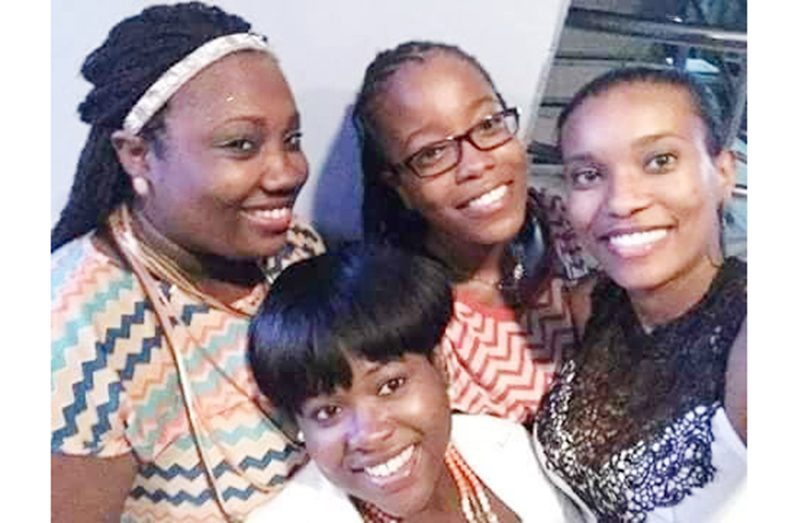-Tomica Chand shares her story, offers advice
IN the prime of life and enjoying motherhood, 36-year-old Tomica Chand never imagined that she would be diagnosed with Breast Cancer. Although there was a chance of this happening, since her paternal grandmother was diagnosed with the dreaded disease, she felt and looked healthy and was doing all that was necessary to live a long, healthy life.
Tomica is Guyanese by birth and is currently living in the United States where she is employed as a dental coordinator. She was diagnosed in March this year, shortly after she felt a lump in one of her breasts while taking a shower.
“I felt overwhelmed. I had a lot of emotions but for my first appointment, my doctor encouraged me to bring someone with me. My stepmom came with me… my sister travelled from Guyana to help me with my children,” she said as she re-lived the moments leading up to her diagnosis and highlighted her strong support system.
Chand who was going through a divorce at the time of her diagnosis, recalled that during her doctor visits, someone always accompanied her. She was never alone which she deeply appreciated as the information she was getting from her doctor was a lot to process.
She said her children, particularly the youngest, saw firsthand the devastating effects the cancer was having on her body.
“My little one, he is four, he didn’t quite understand. He just knew especially when I started doing treatment that I could not play with him. He saw my hair falling out. My oldest one, he understood more but he was afraid of what would happen to me. He was seeing his mother constantly sick and my hair falling out [and] that made it so real”, Chand related.
She emphasised that she appreciates the support she and her children are receiving from relatives.
She pointed out that cancer treatment and adapting to life after the diagnosis was extremely difficult.
Not being able to play with her children the way she was accustomed to, taking them to school or doing other motherly things, took a toll on her mental health.
“I must admit that it was hard,” Chand told the Chronicle, before adding that she placed her faith in God’s hands.
She added that her children are learning every day to cope and deal with the new norm.
Chand is recuperating from surgery and will soon undergo radiation therapy to kill the remaining cancer cells.
Meanwhile, Chand used the opportunity to urge women to regularly do self-examinations of their breasts, which can lead to early diagnosis.
According to her, “women should get to know their bodies.”
“If you feel something off, don’t be afraid to go to the doctor. The pain you feel will not go away because you choose to ignore it. Go to the doctor and get checked. Have a support system, people that you can rely on. Breast cancer not only affects you but people around you,” Chand stated, adding:
“Get to know your bodies, do regular self-examination if you feel something that is not normal. Don’t be afraid to tell your support system what you need and believe and trust in God, and lastly don’t give up. Don’t let cancer win. Keep fighting. “
FRIGHTENING STATISTICS
According to the available statistics, breast cancer deaths in Guyana account for 96 or 1.34 per cent of total reported deaths. The age-adjusted death rate is 25.5 per 100,000 of the population which ranks Guyana at number 23 in the world.
The World Health Organisation (WHO) states on its website that breast cancer is a disease in which abnormal breast cells grow out of control and form tumours. If left unchecked, the tumours can spread throughout the body and become fatal.
The breast cancer cells begin inside the milk ducts and/or the milk-producing lobules of the breast. The earliest form (in situ) is not life-threatening. Cancer cells can spread into nearby breast tissue (invasion). This creates tumours that cause lumps or thickening.
According to WHO, invasive cancers can spread to nearby lymph nodes or other organs (metastasize). Metastasis can be fatal.
Treatment is based on the person, the type of cancer and its spread. Treatment combines surgery, radiation therapy and medications.
Additionally, the organisation states that in 2020, there were 2.3 million women diagnosed with breast cancer and 685 000 deaths globally.
“As of the end of 2020, there were 7.8 million women alive who were diagnosed with breast cancer in the past 5 years, making it the world’s most prevalent cancer. Breast cancer occurs in every country of the world in women at any age after puberty but with increasing rates in later life,” the WHO website states.
WHO earlier this year released a new Global Breast Cancer Initiative Framework which provides a roadmap to attain the targets to save 2.5 million lives from Breast Cancer by 2040.





.jpg)








